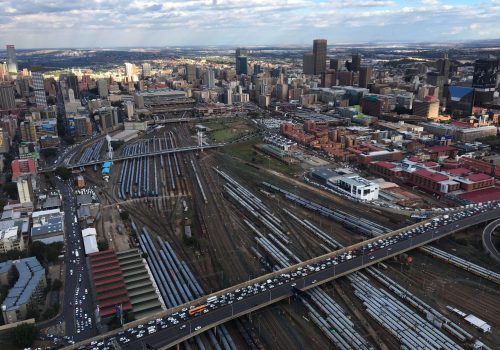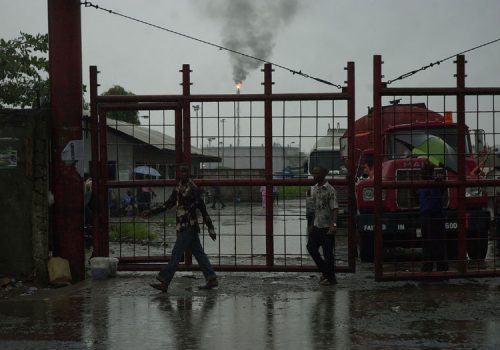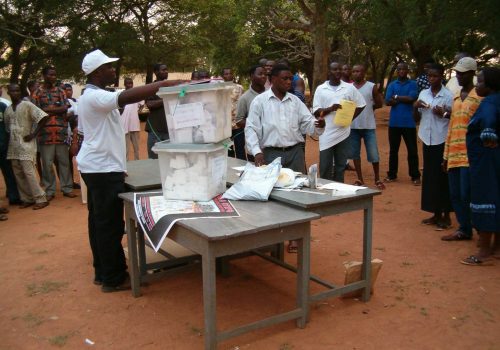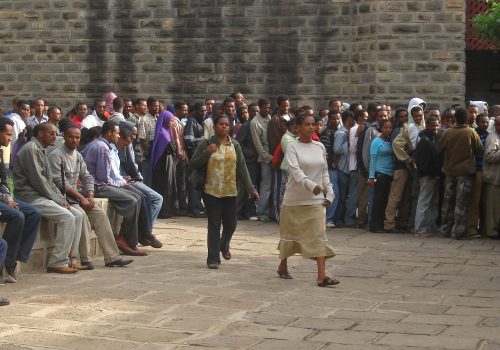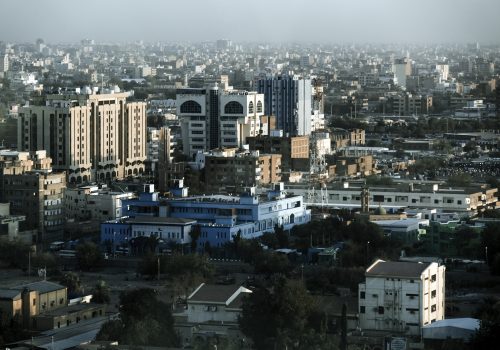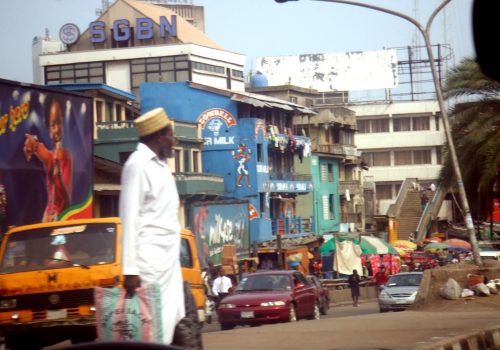What does the coronavirus mean for Africa?
Since its emergence in December 2019, the novel coronavirus has spread rampantly across the globe, overwhelming health systems and cratering the global economy. In the United States—where federal authorities have failed to perform widespread testing for the virus and have therefore been unable to implement the targeted quarantines of infected individuals that have allowed South Korea to defeat the virus with limited disruptions to everyday life—states and cities have been forced to rely on blanket restrictions of movement, including the closure of most schools and businesses. The economic impact of these “social distancing” strategies has been severe, triggering a recession that is expected to rival the Great Depression in its severity, and leading President Trump to call for a reassessment of the response after less than fifteen days—far sooner than epidemiologists recommend.
African nations are unlikely to enjoy this luxury of choice. In the affluent enclaves of Johannesburg or Nairobi, white-collar professionals will be able to homeschool children and telecommute through this crisis, just as professionals are doing in Washington, DC. But more than 70 percent of African urbanites—approximately 200 million people—reside in crowded city slums, with limited access to plumbing or electricity. In those environments, social distancing may be effectively impossible. Some 40 percent of Africans live in water-stressed environments in which obtaining access to clean water—let alone soap—is an insurmountable daily hurdle, and for those populations, even simple measures to prevent the spread of the virus, such as frequent handwashing, will be out of reach. For the 85 percent of Africans who live on less than $5.50 per day, work stoppages will pose an existential threat. Sheltering in place for long periods of time—weeks or more—will simply not be possible. So what will African nations do? Will COVID-19 spread across the African nations as virulently as it has spread through Asia and Europe, or will Africa’s climate and demographics provide some shield?
The answer will vary greatly across and within individual countries. Africa’s smaller, middle-income, and more-industrialized nations (including Senegal, Rwanda, and Botswana) are likely to fare better than large countries that serve as regional transit and economic hubs (like Ethiopia and Nigeria), because they have greater control over their borders and are better equipped to implement social distancing measures than countries with large urban slums and international transit corridors. Countries in conflict (including Somalia, the Democratic Republic of Congo, and Mali) and remote rural villages are also likely to be hit especially hard by COVID-19. There, medical services, electricity, potable water sources, and internet connectivity are mostly lacking. In these least-served and least-accessible areas, news of the virus may spread far more slowly than the disease itself, and COVID-19 will join a list of other killers, including malnutrition and violence. Many coronavirus deaths in conflict and rural zones are likely to remain undiagnosed and unrecorded—there, as in previous epidemics, the extent of suffering may never be fully known.
The coronavirus toll in the crowded megacities and the refugee camps, however, will likely be both visible and terrible. Since the first emergence of the novel coronavirus, epidemiologists have predicted a deadly explosion of cases across the African continent. As in Europe, health care systems are expected to be rapidly overwhelmed. But while Western and Asian nations may attempt to increase their production of needed supplies, African nations do not have the domestic capability to manufacture respirators, medicines, or medical supplies, and may—if they need to rely on humanitarian shipments from donor nations whose own economies have been gutted, whose own hospitals may be overwhelmed and under-resourced, and whose borders may be closed to even humanitarian personnel—rapidly find themselves starved of the basic resources they need to track and treat this disease.
But Africa’s prospects are not unremittingly grim. Many nations have already fallen back on previous experiences containing the Ebola virus, and acted rapidly to institute temperature checks, to cancel international flights, and to impose isolation measures on those who appear ill. These measures may have helped some countries to delay the arrival of COVID-19.
Whether African nations will be able to flatten the curve after COVID-19 begins to spread locally within their populations is a harder question to answer. As the thumbnail case studies that follow indicate, many nations are adopting innovative strategies for containing the spread of the disease. African countries may also, in a best-case scenario, derive some benefit from the climate and unique demographics of the continent. Experts are hoping that the coronavirus will, like seasonal influenza, become less-transmissible in heat, and though we don’t know for sure, some experts have suggested that the continent’s relatively hot climate may help explain the surprisingly slow spread of the virus across Africa.
The continent’s demographics are another potential source of optimism. COVID-19, though virulently contagious, is a disease that is often asymptomatic or mild in youths—and a stunning 70 percent of Africa’s population is under the age of thirty. A mere 4 percent of the population is in the highest-risk age category of over-65. Because this virus afflicts the generations so differently, it is possible that Africa’s experience of coronavirus may vary greatly from that of the aging Western and Asian worlds.
Whether because of the heat, the age of the population, or because African nations were early adopters of screening measures at international airports, the continent’s hospitals have not yet been overrun and only a handful of deaths have been recorded in Sub-Saharan Africa. In spite of the low case load, capital and major cities have already, and especially in the last week, adopted a slew of new measures, from business closures to handwashing stations, to delay the onslaught of the virus.
Outside the major cities, however, there is only a slow spreading of concern. And even within many of the cosmopolitan capitals, misinformation, fake news, and distrust of government authorities is making it harder to restrict movement and limit the size of gatherings. Another source of worry is the critical shortage of hospital beds (African nations generally have fewer than one hospital bed per one thousand people, about one third the capacity of the US) and respirators, which means that only a small fraction of sufferers of the disease can hope for life-saving interventions. And a major unanswered question is how malnutrition, HIV-AIDs, tuberculosis, malaria, or other chronic conditions will interact with COVID-19. If those with compromised immune systems are more likely to suffer worse outcomes, the case fatality rate in Africa may be higher than elsewhere despite the youthfulness of the population. Data on previous epidemics—from the 1918 Spanish flu to the harsh 2002 influenza season—are spotty when it comes to Africa, but suggest that the rate of African deaths may be comparatively high (according to the World Health Organization, the case fatality rate in 2002 was globally less than 0.1 percent, but was 3 percent in Malawi, for example). But in previous epidemics, the vast majority of African deaths have been in children under the age of five—a population that has almost been entirely spared by COVID-19.
As African governments race to divert all available resources to preventing the spread of this disease, they have begun to experience significant economic strains—both from business shut downs and the failing global economy—and they may yet face a significant drop in foreign humanitarian assistance as the donor nations find themselves overwhelmed. Plunging oil prices will decimate the budgets of a number of countries—among them Angola and Nigeria—while the lack of inventory that has resulted from China’s manufacturing and export slowdown threatens business and building activity everywhere in Africa. There is some long-term hope that the coronavirus pandemic, which has put a spotlight on the world’s dangerous dependency on Chinese manufacturing, may ultimately lead to a redirection of supply chains to African and other developing nations. But in the short-term, the economic outlook is probably more dire in Africa than elsewhere.
The Africa Center’s coronavirus coverage will address a series of pressing questions in the days to come:
What will be the economic, political, and social impacts of the virus? How will foreign relations be impacted? And what new security concerns will arise from the pandemic?
Further, how will different countries respond?
Bronwyn Bruton is the director of programs and studies of the Atlantic Council’s Africa Center. Follow her on Twitter @BronwynBruton.
Questions? Tweet them to our experts @ACAfricaCenter.
For more content, go to our Coronavirus: Africa page.
Image: A man wears a face mask, due to the global coronavirus disease (COVID-19) outbreak, as he rides his motorbike along a busy shopping street in Dakar, Senegal. (REUTERS/Zohra Bensemra)
